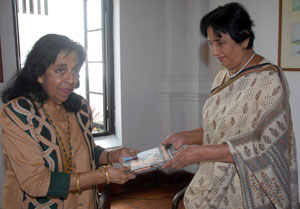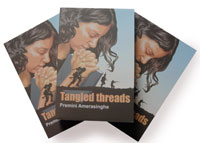Tangled Threads is a novel about growing up in Ceylon/Sri Lanka in the 195Os. Since it was the period in which the author went to school and university, it is a period she knows well, from first-hand experience. And that is a lesson one learns by teaching literature: that realist fiction — as opposed, of course, to fantasy fiction or science-fiction - must be closely related to real life if it is to succeed.
It is sad but true that many writers don't practise this kind of restraint. We have all read novels and stories written by Sri Lankan expatriates who visit Colombo for a couple of weeks, attend the Royal-Thomian or the Rugby Shield matches, show up at a few cocktail parties, dinner-parties and beach-parties, visit Yala or Wilpattu, and may be Kandalama, and go back to London or Toronto or Melbourne or New York to write a novel about 'what's happening out there'. I don't know about you, but that kind of writing invariably produces false notes that I can detect without any trouble at all.
 |
| The author Premini Amerasinghe presenting a copy of her book to Prof. Yasmine Gunaratne
at the launch. Pic by Sanka Vidanagama |
Part of the attraction this novel has for me is its setting. Premini Amerasinghe, like her fellow-novelist Carl Muller, and their distinguished predecessor in the genre Dr. Lucian de Zilwa, is a child of the region, but much more in her writing than in theirs, Kandy becomes a vivid reality.
Peradeniya and Kandy, where I spent some of the most impressionable and memorable years of my own life, have a character of their own, quite distinct from the busy, urban settings of most recent fiction.
When you take your characters beyond the Kadugannawa Pass, as I did in my last novel, you take them into a different world.
Here is a brief vision of Premini’s world:
“Around the university buildings and the great Halls of Residence flowed a landscape of undulating lawns and trees. What trees they were! The Na tree with its tender pink spears contrasting with the dark gloss of its mature foliage, its white-petalled yellow-centred flower a symbol of purity. The Ficus trees spreading umbrella-like, their roots reaching towards the limits of the canopy. Resembling miniature mountain-ridges, those roots’ intervening ravines provided arm-chair comfort for me and Pradeep, (the boy who lived next door). Huge rain-trees spread their branches out against the sky in striking patterns. From April to July streamers of yellow blossoms poured down from a parasite creeper. The temptation was always strong to stand beneath the tree on which it grew, and yell “Rapunzel, Rapunzel, let down your hair!” (p. 4)
Reading her late grandfather’s diaries, kept during his time as a Biology professor in the University’s early years, Pushpa discovers a human society that is far from idyllic, contrasting with the beauty of its setting as sharply as the blossoms of the Na tree contrast with its leaves.
Petty intrigues, tale-telling, anonymous letters are the order of the day. Every evening we gravitate towards the water-hole (otherwise known as the Staff Club) where the most profound thoughts find expression, after the alcohol level in the blood has risen to dizzy heights ... (p. 62)
Anyone familiar with the Peradeniya campus will know why these revelations come to our heroine at second-hand, as it were, through the diaries of her eminent grandfather. The reason is simple: the Staff Club at Peradeniya, like many gentlemen’s clubs in Britain, does not welcome the presence of ladies. There, ladies can be talked of, or about, but they are not talked to. Reading her grandfather’s diaries, Pushpa learns that In the heady atmosphere of the campus, sexual infidelities had flourished like the trees in Peradeniya Gardens, sometimes amusing — as when a ‘harem’ of attractive students provided a charming bachelor academic with tea and comfort — sometimes tragic as when ‘Mrs X put her head in a gas oven because her professor husband was involved with a student’, and sometimes yielding high comedy, as when the diaries yield a memorable image of a cylinder of woven rush matting running down Hantane hill in the early light of dawn. The angry wife of a ‘staid professor’, who had found her husband romancing their maid, had chased the maid out of the house, wrapped only in her mat, ‘memento of illicit pleasure’.
 |
The ‘tangled threads’ of this novel are the threads of memory and experience. Here is our Sri Lankan narrator-heroine, an attractive, 30- something English teacher living in Kandy, picking up the threads of an old friendship. A former school-friend, Sushila, visits from the States. They laze beneath the trees and talk about old times. They talk about schooldays, and they talk about ... well, they talk about what matters most to them both, at their stage of life, they talk about sex.
“Sushila was startled to learn that ‘sex’ was still no more than a three- letter word for me. She seemed to regard her varying sexual adventures as the most exciting part of her life in America. Under her tutelage, my sexual education progressed by leaps and bounds. [double meaning intended there, wouldn’t you agree?] She described the pleasures ... of orgasm in ‘sexplicit’ detail. Hispanics. African Americans, Eastern European migrants, the descendants of the founding fathers, native Indians, all, according to Sushila, had their distinctive style ... Sri Lankans didn’t figure in her love life. For one thing, she was convinced they were poor performers, and for another, the whole of Sri Lanka would get to know about it, so that deciding to marry a Sri Lankan and settle down here would be out of the question. Her riveting account left me with burning ears, rather than a burning desire to put my newly acquired knowledge into practice. (p.82)
In Pushpa, as you will immediately recognize, Premini gives us a perfect specimen of that kind of girl beloved of Sri Lankan parents and aunts, ‘the sweet and simple kind’.
Looking after Pushpa, and incidentally supervising her love-life, is one of the most amusing and endearing characters I have encountered in Sri Lankan fiction, her elderly ayah Jane. If you have known a household dominated by a ‘Jane’, bossy, talkative, fiercely protective of her youthful charge, you will recognize her at once. When imports are restricted by Government decree, Jane's creative instincts rise to the occasion, and Pushpa's lunch-box as a child, making her eager to go to school, contains the following gourmet items:
Memories of her home-made sandwich fillings still make my mouth water: sardines in tomato sauce, turned out at home with small fish in the pressure-cooker, potted meat (boiled meat, flavoured with spices and crushed on her grinding-stone), cream cheese made by adding lime-juice to boiling milk, straining the resulting curds through a muslin cloth, and mixing them with chopped parsley, onions and green chillies...
This is based, of course, on Premini's experiences of the austerities of the 1970s, and reading about Jane brought back a memory from my own ten years at Peradeniya, when I found myself combining the tasks of academic and inexperienced housewife, under conditions that called for skills and resourcefulness I didn't know I had.
While Pushpa strives to untangle her personal and professional relationships, the diaries take us beyond Kandy, and even Sri Lanka, to Europe in the 1920s, and the Spanish civil war, in which her grandfather had involved himself as many British students of his age had done. Premini Amerasinghe’s meticulous research renders this part of her novel wholly believable, and readers would find especially interesting the parallels drawn in this novel between Sri Lanka’s civil war and those of other nations.
Other elements that provide the novel with its substance relate in part to clues hidden in the diaries, which give Pushpa unexpected insight into her grandfather’s private life, and in part to the contemporary realities of the lives of two other major characters: Pradeep, the physician who was her childhood friend, and Daya, the teacher with whom she falls briefly in love. The physical aspects of renal disease, which play an important part in the novel, are not glossed over.
Here Premini’s medical knowledge and experience stand her in good stead, as well, I suspect, as the great advantage of having in her corner, as it were, the unfailing encouragement of another physician, her husband Mark.
I shall conclude these brief remarks by mentioning a rule I would recommend to any student of writing, which is to focus on something you feel strongly and deeply about. Writing a novel like Premini’s calls for strength and stamina from a writer, so much so that only a strong commitment can keep you going until you reach the end. The characters in her novel grow up, fall in love, and indulge in political and amorous shenanigans of one kind and another, but through all this there shines evidence of the author’s commitment to a theme - the passionate wish of her generation (which is also mine) that we had made better use of the opportunities presented to us by our past.
So, Premini, we must thank you for giving us such a thoughtful and intelligent book. Of course, one expects no less from an author whose work has not only been short-listed for local prizes but long-listed for a major international award.
‘Tangled Threads’, a Sarasaviya publication is available at Sarasaviya Bookshops.
Price: Rs. 375 |



